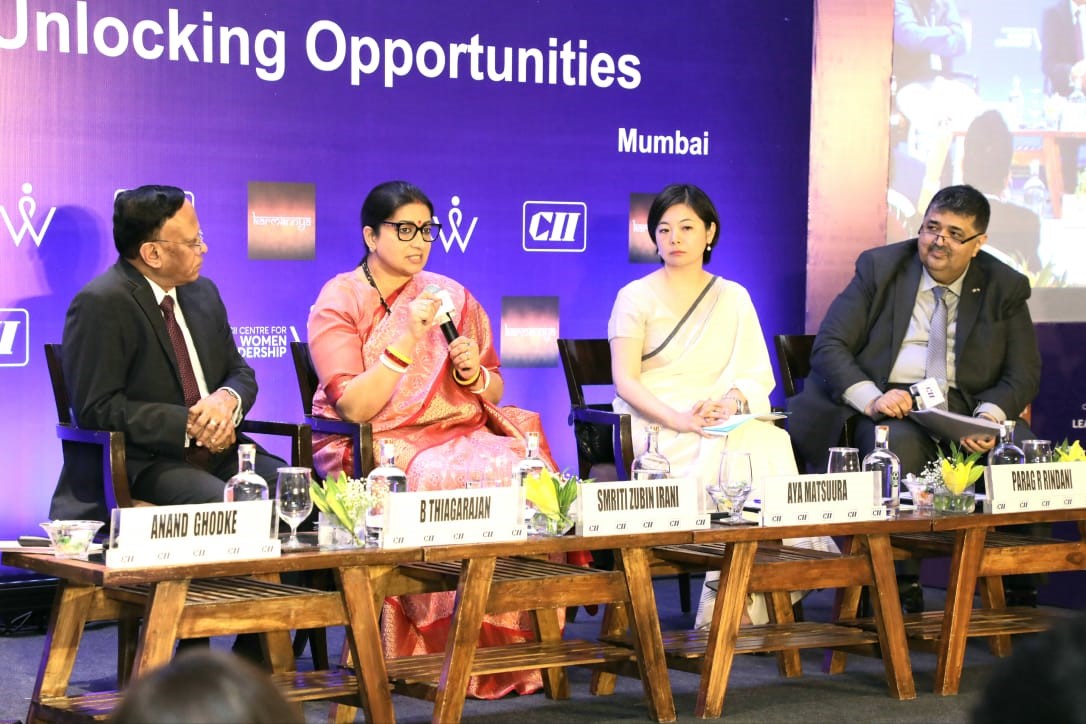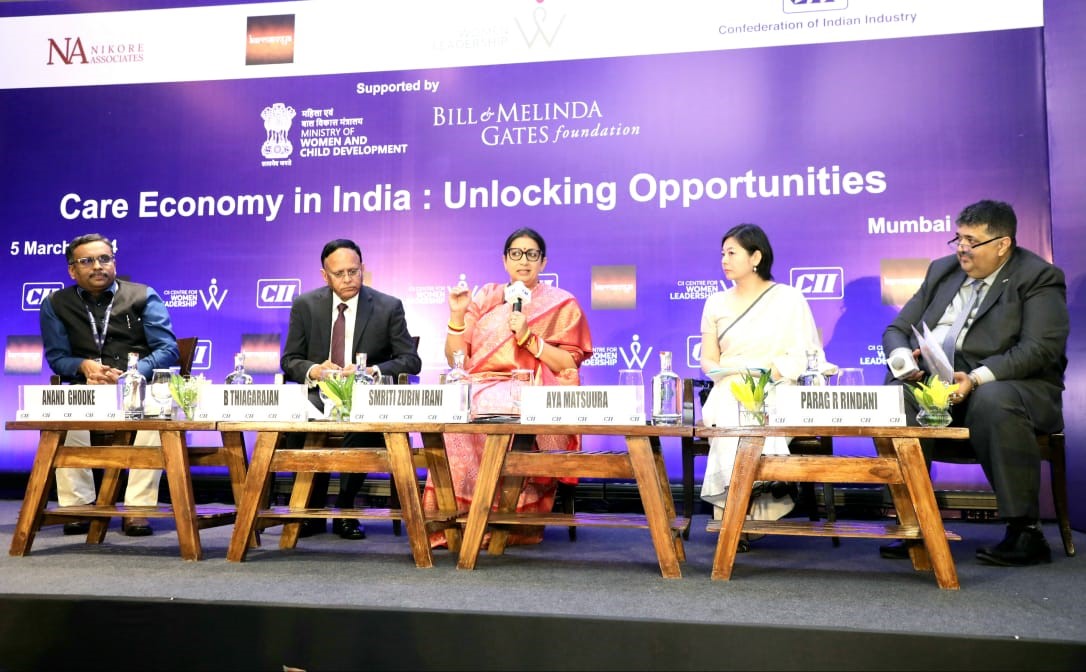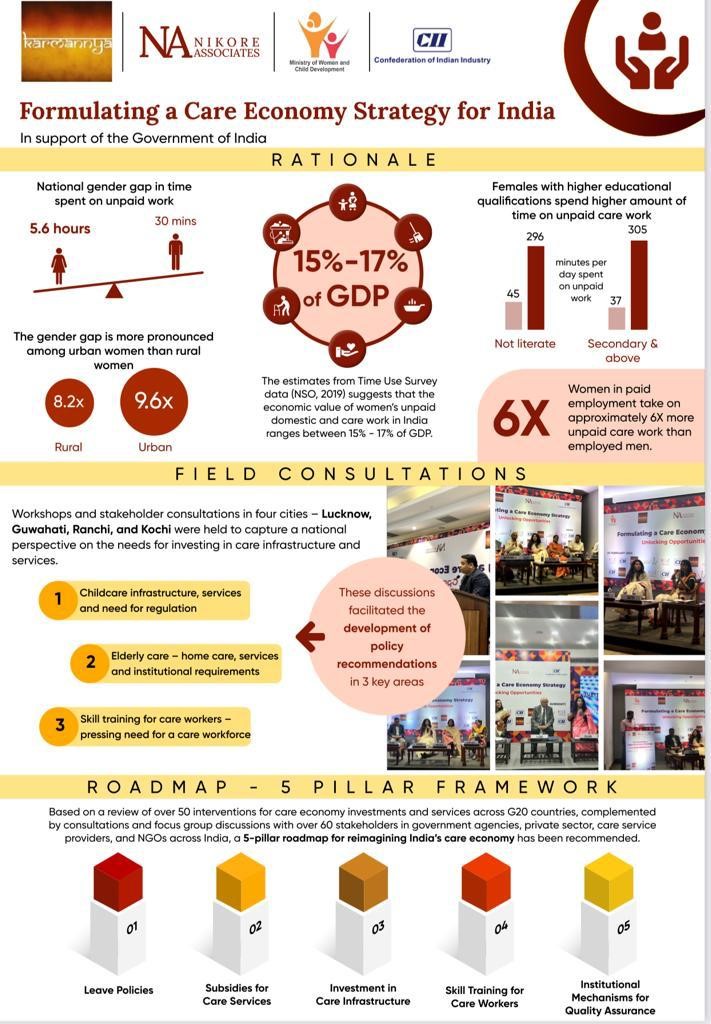Ministry of Women and Child Development
Business Case for Care economy will make it affordable to Middle class and lead to women and Child development: Smriti Irani
All Round Care economy is the need of the Hour: WCD Minister
Report by CII on “Formulating a Strategy for India’s Care Economy: Unlocking Opportunities” Published
प्रविष्टि तिथि:
05 MAR 2024 6:22PM by PIB Mumbai
Mumbai, 5 March 2024
We should not limit the care economy just to the creches as it will hide the the financial impact of the care economy. Business case for the care economy needs to be built to attract investment into it. Our society prides itself for taking care of its own due to our family values. However nowadays nuclear families in India are becoming micro families and single parent families as children in their twenties are going away for work. We need to prepare for this reality from socio-economic point of view, said Union Minister for Women and Child Development & Minority Affairs Smt. Shrimati Smriti Irani during conference 'Care Economy: Unlocking Opportunities' organized by the Confederation of Indian Industry (CII)

Minister further stressed the need to make geriatric care affordable to the middle class. Minister also pointed out the tendency among Indians to prioritise children’s future to their old age does not help.
Minister appealed to everyone to look at the Care economy with all the angles to make it capable of fulfilling health, well-being, residential and other kinds of needs of the elderly and to see the possibility of exporting Care economy workers.

As part of efforts towards strengthening the Care workforce in the country, the Cabinet Committee on Economic Affairs, chaired by the Prime Minister Shri Narendra Modi, recently approved establishment of 157 new nursing colleges in co-location with the existing medical colleges established since 2014 by spending Rs.1,570 crore.The step will add approximately 15,700 nursing graduates every year. This will further ensure quality, affordable, and equitable nursing education in India, particularly in underserved districts and States/Union Territories.
B Thiagrajan, chairman,CII said on this occasion that Care economy is central to the society and CII is committed to embark on journey to talk with stakeholders to understand the implications of gender gap in care work on women’s well being and financial independence. He also spoke about Recently established CII- Centre for Women leadership with the help of Bill and Melinda Gates foundation which was also inaugurated by Smt. Smriti Irani

Excerpts from the report:
Need for a Care Economy Strategy in India is evident as India's demographic landscape is expected to change between 2020 to 2050, necessitating more elderly care alongside continuing levels of childcare. Over the next few decades, not only will the population grow, but there will also be a demographic transition. By 2050, the proportion of elderly persons is expected to increase to 20.8% of the population, i.e. about 347 million persons. Moreover, even as the proportion of children reduces marginally to 18%, the number of children will still be close to 300 million
India is presently experiencing wide gender gaps in unpaid domestic and care work. As per data from the Time Use Survey conducted by the National Statistical Organization (NSO) between January and December 2019, women of working age (15 – 59 years) spend most of their waking hours on unpaid work, whereas men spend the majority of their day in paid employment.
Revitalizing the care economy is therefore critical to realize the vision of women-led development in Viksit Bharat @2047. India is a rapidly growing economy, which is also undergoing a demographic transition with a substantial dependency burden from children and a growing elderly population. Moreover, India is also experiencing significant gender gaps in unpaid care and domestic work, which constrain women’s labour force participation. Women’s unpaid care and domestic work in India represents an economic value of almost 15%-17% of the GDP. Thus, going forward, as India enters an era of rapid growth in Amrit Kaal, and embarks on its path of emerging as Viksit Bharat by 2047, there is a pressing need for prioritizing investments from both the public and private sectors in rebuilding the care economy, and realizing new business opportunities in the care sector for women-led development.
Complete report can be read here.
* * *
PIB Mumbai | Jaydevi PS/MaheshC/D.Rane
Follow us on social media: @PIBMumbai
@PIBMumbai  /PIBMumbai
/PIBMumbai  /pibmumbai
/pibmumbai  pibmumbai[at]gmail[dot]com
pibmumbai[at]gmail[dot]com  /PIBMumbai
/PIBMumbai  /pibmumbai
/pibmumbai
(रिलीज़ आईडी: 2011689)
आगंतुक पटल : 2294
इस विज्ञप्ति को इन भाषाओं में पढ़ें:
Marathi